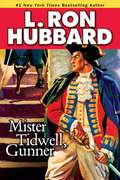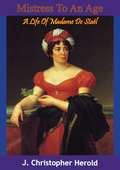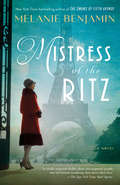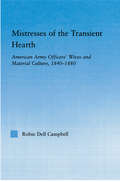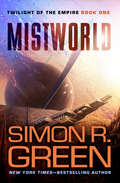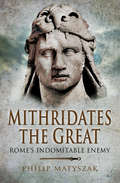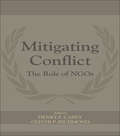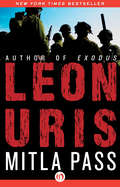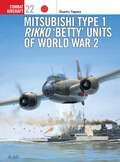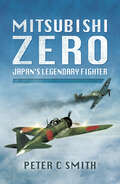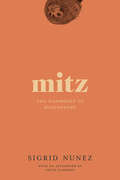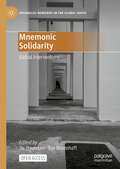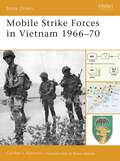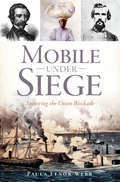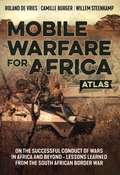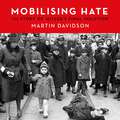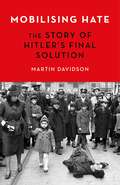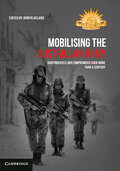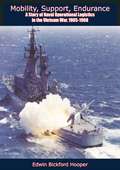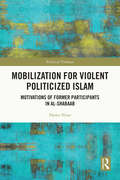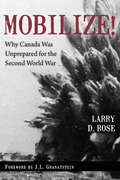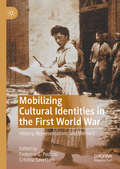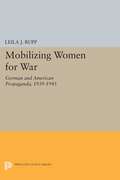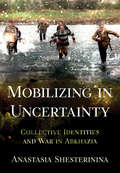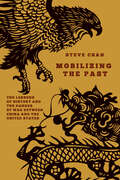- Table View
- List View
Mister Tidwell Gunner
by L. Ron HubbardImagine a young Laurence Olivier cast as a scholarly Oxford professor--an academic snatched out of his bookish world and pressed into service aboard Lord Nelson's legendary British fleet--in the position of schoolmaster. Such is the life of the land-loving, seafaring Mister Tidwell, Gunner.Thrust into service at the height of the Napoleonic Wars, Tidwell soon finds himself directly in the line of fire and way out of his depth. Fate has cast him into a terrible and terrifying spot--alone on deck to face the fearsome approach of a French man-o'-war.The professor is about to get an object lesson in war, self-reliance . . . and survival. Overwhelmed by the smell of gunpowder, the sound of cannons, and the sight of death, he will either experience the sweet taste of victory . . . or the bitter taste of his own blood.In an essay called Search for Research Hubbard wrote about how he came up with story ideas: "I want one slim, forgotten fact. From there a man can go anywhere. . . . In one old volume, for instance, I discovered that there was such a thing as a schoolmaster aboard Nelson's ships. . . . When did this occur? . . . The Napoleonic Wars." Drawing on this single obscure discovery, Hubbard delved deeper into the history and let his remarkable imagination do the rest. "Complete after a few days of search, I had my Mister Tidwell, Gunner."Also includes the sea adventures The Drowned City, the story of two deep-sea divers who set out in search of a long-lost treasure only to find that the waters are full of treacherous currents and even more treacherous men; and Submarine, in which a young sailor on leave enjoys a quiet interlude with his girlfriend--only to have it interrupted by a call to duty and danger.
Mistress To An Age: A Life Of Madame De Staël
by J. Christopher HeroldJ. Christopher Herold vigorously tells the story of the fierce Madame de Stael, revealing her courageous opposition to Napoleon, her whirlwind affairs with the great intellectuals of her day, and her idealistic rebellion against all that was cynical, tyrannical, and passionless. Germaine de Stael's father was Jacques Necker, the finance minister to Louis XVI, and her mother ran an influential literary-political salon in Paris. Always precocious, at nineteen Germaine married the Swedish ambassador to France, Eric Magnus Baron de Stael-Holstein, and in 1785 took over her mother's salon with great success. Germaine and de Stael lived most of their married life apart. She had many brilliant lovers. Talleyrand was the first, Narbonne, the minister of war, another; Benjamin Constant was her most significant and long-lasting one. She published several political and literary essays, including "A Treatise on the Influence of the Passions upon the Happiness of Individuals and of Nations, " which became oneof the most important documents of European Romanticism. Her bold philosophical ideas, particularly those in "On Literature, " caused feverish commotion in France and were quickly noticed by Napoleon, who saw her salon as a rallying point for the opposition. He eventually exiled her from France.<P><P> Winner of the 1959 National Book Award
Mistress of the Ritz: A Novel
by Melanie BenjaminA captivating novel based on the story of the extraordinary real-life American woman who secretly worked for the French Resistance during World War II—while playing hostess to the invading Germans at the iconic Hôtel Ritz in Paris—from the New York Times bestselling author of The Aviator's Wife and The Swans of Fifth Avenue.“A compelling portrait of a marriage and a nation at war from within.”—Kate Quinn, author of The Alice Network Nothing bad can happen at the Ritz; inside its gilded walls every woman looks beautiful, every man appears witty. Favored guests like Ernest Hemingway, F. Scott Fitzgerald, Coco Chanel, and the Duke and Duchess of Windsor walk through its famous doors to be welcomed and pampered by Blanche Auzello and her husband, Claude, the hotel’s director. The Auzellos are the mistress and master of the Ritz, allowing the glamour and glitz to take their minds off their troubled marriage, and off the secrets that they keep from their guests—and each other. Until June 1940, when the German army sweeps into Paris, setting up headquarters at the Ritz. Suddenly, with the likes of Hermann Goëring moving into suites once occupied by royalty, Blanche and Claude must navigate a terrifying new reality. One that entails even more secrets and lies. One that may destroy the tempestuous marriage between this beautiful, reckless American and her very proper Frenchman. For in order to survive—and strike a blow against their Nazi “guests”—Blanche and Claude must spin a web of deceit that ensnares everything and everyone they cherish.But one secret is shared between Blanche and Claude alone—the secret that, in the end, threatens to imperil both of their lives, and to bring down the legendary Ritz itself.Based on true events, Mistress of the Ritz is a taut tale of suspense wrapped up in a love story for the ages, the inspiring story of a woman and a man who discover the best in each other amid the turbulence of war.Advance praise for Mistress of the Ritz“No one writes of the complexities of women’s lives and loves like Melanie Benjamin. In Mistress of the Ritz, Benjamin brings wartime Paris brilliantly to life. . . . Intense, illuminating, and ultimately inspiring!”—Elizabeth Letts, New York Times bestselling author of Finding Dorothy
Mistresses of the Transient Hearth: American Army Officers' Wives and Material Culture, 1840-1880
by Robin D. CampbellThis book explores the ways in which mid-19th Century American army officers' wives used material culture to confirm their status as middle-class women.
Mistworld (Twilight of the Empire #1)
by Simon R. GreenLong before the start of a galactic rebellion, Mistworld is just another rebel planet, cut off from the fruits of empire by a punishing blockade. In a spaceport where ships hardly land anymore, and any piece of high tech is worth far more than its weight in gold, a medieval order has imposed itself on this once-rich world: The strong rule, the weak perish, and no one is too rich to steal.Investigator Topaz is one of the few honest people left on this cutthroat planet. With her husband, Sergeant Michael Gunn, Topaz does what she can to keep the crooks who run Mistworld in check. But when the corrupt Empire devises an unprecedented scheme to attack the ESP shield that guards Mistworld, Topaz is the only one who can save the planet from being overrun. An enemy fleet lurks just off world--but it is the enemies at home whom Topaz and Gunn should fear the most.
Mithridates the Great: Rome's Indomitable Enemy
by Philip MatyszakA military biography of Mithridates VI the Great of Pontus, Romes most persistent enemy. The Mithridiatic wars stretched over half a century and two continents, and have a fascinating cast of pirates, rebels, turncoats and poisoners (though an unfortunate lack of heroes with untarnished motives). There are pitched battles, epic sieges, double-crosses and world-class political conniving, assassinations and general treachery. Through it all, the story is built about the dominant character of Mithridates, connoisseur of poisons, arch-schemer and strategist; resilient in defeat, savage and vindictive in victory. Almost by definition, this book will break new ground, in that nothing has been written on Mithridates for the general public for almost half a century, though scholarly journals have been adding a steady trickle of new evidence, which is drawn upon here. Few enough leaders went to war with Rome and lived long to tell the tale, but in the first half of the first century BC, Mithridates did so three times. At the high point of his career his armies swept the Romans out of Asia Minor and Greece, reversing a century of Roman expansion in the region. Even once fortune had turned against him he would not submit. Upto the day he died, a fugitive drive to suicide by the treachery of his own son, he was still planning an overland invasion of Roman itself.
Mitigating Conflict: The Role of NGOs
by Oliver P. Richmond Henry F. CareyThis title examines the roles and new opportunities arising from the increasing participation of non-governmental organizations (NGOs) in peace-making, peacekeeping and peace-building processes, both formal and informal, state-sponsored and unofficial. Drawing on both academic experts and activists, this study brings together contributions from those who have observed how NGOs have sought to reflect civil society concerns, provide humanitarian relief, monitor compliance with international norms and treaty requirements, and disseminate information of concern to advocacy networks.A critical appraisal of the opportunities and constraints of NGOs is provided alongside the examination of the NGOs role in the "new agendas" for peace.
Mitla Pass
by Leon UrisA writer travels to Israel to research a novel, but he ends up drawn into the Suez Crisis How did Gideon Zadok, an American novelist and screenwriter, end up pinned by artillery shells in Mitla Pass? It was never his plan to fight someone else's war. He came to Israel to research a book, but also to escape a crumbling marriage, a dysfunctional family, and the pressures of newfound success in the States. But in fleeing from personal troubles he charged headfirst into one of the great global crises of the twentieth century. Perhaps Leon Uris's most introspective work, Mitla Pass portrays a man caught between his own demons and the epic sweep of Middle Eastern history. This ebook features an illustrated biography of Leon Uris including rare photos from the author's estate.
Mitsubishi Type 1 Rikko Betty Units of World War 2
by Osamu Tagaya Mark StylingThe most produced Japanese bomber of the World War II (1939-1945), the G4M saw action on every front from the first day of the Pacific conflict through to VJ-Day. The 'Betty's' very long range made it a key weapon during the opening year of the war. However, to achieve this, the aircraft was built with very little protective armour for its crew or fuel tanks, and Allied pilots soon exposed its extreme vulnerability. In the first in a series of volumes examining the key Japanese aircraft of WW2, Dr Osamu Tagaya details the G4M's extensive combat history, and lists all the units which operated the bomber.
Mitsubishi Zero: Japan's Legendary Fighter
by Peter C. SmithA history of the Japanese aircraft, “illustrated by well reproduced black and white photographs” details the plane’s impressive WWII aviation record. (Aviation News)The Mitsubishi Zero is one of the greatest fighter aircraft ever to have graced the skies. Symbolic of the might of Imperial Japan, she represented a peak of developmental prowess in the field of aviation during the early years of the Second World War. Engineered with maneuverability in mind, this lightweight, stripped-back aircraft had a performance that left her opponents totally outclassed. The dogfights this aircraft engaged in with the Chinese, British, Dutch and American warplanes in the 1941-42 period are the stuff of aviation legend. The Zero remained a potent threat until the end of the war, not least in her final role, that of a Kamikaze plane, in which she created as much havoc on the sea as she had done earlier in the air.Peter C. Smith takes the reader on a journey from inspired inception to the blazing termination of this unique aircraft, the first Naval fighter to be superior to land-based aircraft. Mitsubishi Zero describes in detail the many victories that punctuated the early days of the plane’s operational career as well as the final days of the Second World War which witnessed her demise. Smith also lists the preserved Zero aircraft on display today. This is a fast-paced and fascinating history of a fighter aircraft like no other.
Mitz: The Marmoset of Bloomsbury
by Sigrid NunezThis "tender biography of a sickly marmoset that was adopted by Leonard Woolf and became a fixture of Bloomsbury society" (The New York Times) is an intimate portrait of the life and marriage of Leonard and Virginia Woolf from a National Book Award-winning author.In 1934, a "sickly pathetic marmoset” named Mitz came into the care of Leonard Woolf. After he nursed her back to health, she became a ubiquitous presence in Bloomsbury society. Moving with Leonard and Virginia Woolf between their homes in London and Sussex, she developed her own special relationship with each of them, as well as with their pet cocker spaniels and with various members of the Woolfs’ circle, among them T. S. Eliot and Vita Sackville-West. Mitz also helped the Woolfs escape a close call with Nazis during a trip through Germany just before the outbreak of World War II. Using letters, diaries, memoirs, and other archival documents, Nunez reconstructs Mitz’s life against the background of Bloomsbury’s twilight years. This tender and imaginative mock biography offers a striking look at the lives of writers and artists shadowed by war, death, and mental breakdown, and at the solace and amusement inspired by its tiny subject--and this new edition includes an afterword by Peter Cameron and a never-before-published letter about Mitz by Nigel Nicolson.“In short, glistening sentences that refract the larger world, Ms. Nunez describes the appealingly eccentric, fiercely intelligent Woolfs during a darkening time.” —The Wall Street Journal
Mnemonic Solidarity: Global Interventions (Entangled Memories in the Global South)
by Eve Rosenhaft Jie-Hyun LimThis open access book provides a concise introduction to a critical development in memory studies. A global memory formation has emerged since the 1990s, in which memories of traumatic histories in different parts of the world, often articulated in the terms established by Holocaust memory, have become entangled, reconciled, contested, conflicted and negotiated across borders. As historical actors and events across time and space become connected in new ways, new grounds for contest and competition arise; claims to the past that appeared de-territorialized in the global memory formation become re-territorialized – deployed in the service of nationalist projects. This poses challenges to scholarship but also to practice: How can we ensure that shared or comparable memories of past injustice continue to be grounds for solidarity between different memory communities? In chapters focusing on Europe, East Asia and Africa, five scholars respond to these challenges from a range of disciplinary perspectives in the humanities.
Mobile Strike Forces in Vietnam 1966-70
by Gordon RottmanUS Special Forces in Vietnam created and trained the Civilian Irregular Defense Group, a large paramilitary organization designed to operate out of fortified camps in remote areas and protect the local population from Viet Cong incursions, whilst conducting border surveillance, raids and combat patrols in the local area. Their fortified camps were often overrun by the Viet Cong and, having no spare manpower, the US Special Forces created dedicated reaction units which could act in a responsive and flexible manner - Mobile Strike (MIKE) Forces.This book examines the MIKE units, which were formed from the CIDG, the parachute and airmobile training they were given, and the operations that they undertook, from relieving friendly camps to large-scale independent offensive operations. Written by Gordon L. Rottman, a former US Special Forces soldier in Vietnam, this title provides the first organizational history of the MIKE forces in this conflict.
Mobile Under Siege: Surviving the Union Blockade (Civil War Series)
by Paula Lenor WebbOn August 5, 1864, the Civil War arrived at Mobile's doorstep. The Union navy blockaded Mobile Bay and the city for eight months. Confederate general Dabney Maury fought to protect the city and its citizens who refused to leave, such as Octavia LeVert and Augusta Evans. Union admiral Farragut and General Canby slowly starved the city, knowing that the fall of Mobile could end the war. Author Paula Webb details the experiences of the ordeal and the defeat of a Confederate city that echoed through the entire country.
Mobile Warfare For Africa: On The Successful Conduct Of Wars In Africa And Beyond - Lessons Learned From The South African Border War
by Roland DeVries Camille Burger Willem SteenkampPresenting a remarkable amount of experience drawing primarily from South Africa’s Border War in the form of case studies, supported fully by an extensive number of photographs and specially commissioned maps, this study has applications for historians, researchers, and contemporary military practice. <p><p> This is an easy-to-read book with many real-life case-studies and examples which presents a yardstick for the enhancement of contemporary combat practices. In this context, the Namibian-Angolan-South African Border War serves as one of the principal benchmark studies. It was an armed struggle which typically evolved into a transnational conflict over time and which brought about all the imaginable political, diplomatic, military and social ramifications and complexities of African warfare. More so, this war included low as well as high intensity engagements across the full spectrum of warfare, playing out within a vast geographical expanse over an extended period – all elements holding valuable lessons to be learned from. <p> The book therefore provides a knowledge resource for enrichment of the intrinsic know-how of commanders and young leaders for the successful conduct of warfare in Africa and similar battlefield environments. In this regard the pages contain a wealth of hands-on military concepts to be used for the conduct of conventional, unconventional or peace support operations or the more integrated form thereof. <p> It is also significant to realize that southern Africa served as a leading laboratory for counterinsurgency warfare at the time of the South African Border War, from which much can be learned by military practitioners, historians and scholars worldwide. <p> Many valuable lessons can be learned from the African way of warfare and what is referred to today as ‘4th Generation’ and/or asymmetric warfare, besides providing insights as to how this will influence future military needs and requirements, for instance the development of forces and the incorporation and employment of advanced technology.
Mobilising Hate: The Story of Hitler's Final Solution
by Martin Davidson'Finally, eight decades on, there comes a convincing reason as to how an entire nation was able to swallow and then endorse the warped ideology of Hitler and the Nazis. Not only a brilliantly argued book, Mobilising Hate is also a grimly compelling and utterly absorbing examination of one of the most terrible events in world history. Martin Davidson's meticulous and scholarly research and exquisite writing has provided us with one of the most important books ever written on the subject.' JAMES HOLLAND'A highly readable thesis of how ordinary people were turned into monsters by the malevolent propaganda of Hitler and his henchmen ... A very good book.' SAUL DAVID, TelegraphBy 1942, it was an article of faith that what the Nazis called 'The Jewish Question' had only one answer: the mass extermination of an entire people. Six million European Jews were savagely murdered as a result of this perverted but profoundly held conviction. In this radical new perspective on Hitler's so-called 'Final Solution', Martin Davidson shows that the terrible fate of Europe's Jews was not one Nazi policy amongst many, but the central preoccupation of the regime, one which they were determined to achieve and of which they were most chillingly proud. How were so many people convinced that the Jews deserved such treatment - or were at least persuaded to shrug their shoulders and turn a blind eye? Why did they think Germany could only be reborn with their eradication? That Jewish suffering was not only necessary, but deserved? How were the moral standards of an entire nation so warped and perverted, that the Final Solution came to be regarded as a rational, thrilling, even sacred, element of Nazi state policy? Mobilising Hate examines in detail how Nazi ideologues worked to frame and amplify anti-Jewish feeling in Germany. Davidson explores the origins of radical anti-Jewish polemic in the volcanic upheavals that swept over Germany in the months after the First World War. How it seeded a theory that claimed to explain the truth of the entirety of human history. How that theory would go on to pervert science; corrupt the law; rewrite history; taint art, music and literature; and turn the media into the servant of a brutal and pitiless regime with a single message to communicate: destroying Jews lives was the indispensable first step to making Germany - and indeed, Europe - great again. Davidson goes on to track the way in which Nazi leaders moved from theory to practice, by accident and by design, skilfully dramatising the many twists and turns that would lead to Auschwitz and beyond, many of which are not generally included in conventional accounts. Mobilising Hate is driven by the first-hand accounts of many of those defined by the Nazi genocide; both its architects and perpetrators, as well as its targeted victims. Poignantly too, the book turns the spotlight on the whistle-blowers who saw, recorded and shared accounts of the horrors unfolding across the continent - only to be greeted time and time again, with guarded and non-committal hedging from Allied governments. Many people inside Germany, and across the world, knew, but, it seemed, very few felt they needed to care. As our world once again grapples with the challenges of global mass resentment, economic insecurity and the growing desire to find people - entire populations - at whom to point the finger of blame, the issue of Hitler's Final Solution and the thinking that gave birth to it have worrying new resonance. Rarely has the 'warning from history' been so acute, nor the refrain 'never again', been so heartfelt. Above all, Mobilising Hate is the story of how the Nazis spawned a vision of 'us' and 'them', that taken to its logical conclusion, spelled a death sentence for millions. Hitler may have lacked an early masterplan for the mass extermination of Europe's Jews, but it would be his zealously constructed policies and unflinching determination to see them
Mobilising Hate: The Story of Hitler's Final Solution
by Martin DavidsonPraise for The Perfect Nazi:'Absorbing, highly readable and painstakingly researched' NIALL FERGUSON 'Unforgettable, haunting reading' SIMON SCHAMA'A fascinating and extraordinary journey into the banality of evil at the heart of Nazism' BEN MACINTYREBy 1942, it was an article of faith that what the Nazis called 'The Jewish Question' had only one answer: the mass extermination of an entire people. Six million European Jews were savagely murdered as a result of this perverted but profoundly held conviction. In this radical new perspective on Hitler's so-called 'Final Solution', Martin Davidson shows that the terrible fate of Europe's Jews was not one Nazi policy amongst many, but the central preoccupation of the regime, one which they were determined to achieve and of which they were most chillingly proud. How were so many people convinced that the Jews deserved such treatment - or were at least persuaded to shrug their shoulders and turn a blind eye? Why did they think Germany could only be reborn with their eradication? That Jewish suffering was not only necessary, but deserved? How were the moral standards of an entire nation so warped and perverted, that the Final Solution came to be regarded as a rational, thrilling, even sacred, element of Nazi state policy? Mobilising Hate examines in detail how Nazi ideologues worked to frame and amplify anti-Jewish feeling in Germany. Davidson explores the origins of radical anti-Jewish polemic in the volcanic upheavals that swept over Germany in the months after the First World War. How it seeded a theory that claimed to explain the truth of the entirety of human history. How that theory would go on to pervert science; corrupt the law; rewrite history; taint art, music and literature; and turn the media into the servant of a brutal and pitiless regime with a single message to communicate: destroying Jews lives was the indispensable first step to making Germany - and indeed, Europe - great again. Davidson goes on to track the way in which Nazi leaders moved from theory to practice, by accident and by design, skilfully dramatising the many twists and turns that would lead to Auschwitz and beyond, many of which are not generally included in conventional accounts. Mobilising Hate is driven by the first-hand accounts of many of those defined by the Nazi genocide; both its architects and perpetrators, as well as its targeted victims. Poignantly too, the book turns the spotlight on the whistle-blowers who saw, recorded and shared accounts of the horrors unfolding across the continent - only to be greeted time and time again, with guarded and non-committal hedging from Allied governments. Many people inside Germany, and across the world, knew, but, it seemed, very few felt they needed to care. As our world once again grapples with the challenges of global mass resentment, economic insecurity and the growing desire to find people - entire populations - at whom to point the finger of blame, the issue of Hitler's Final Solution and the thinking that gave birth to it have worrying new resonance. Rarely has the 'warning from history' been so acute, nor the refrain 'never again', been so heartfelt. Above all, Mobilising Hate is the story of how the Nazis spawned a vision of 'us' and 'them', that taken to its logical conclusion, spelled a death sentence for millions. Hitler may have lacked an early masterplan for the mass extermination of Europe's Jews, but it would be his zealously constructed policies and unflinching determination to see them through to the bitter end that would make it impossible for his Nazi Holocaust not to happen. That the Jews should face total extermination was Hitler's biggest, proudest prophecy, and the one he moved mountains to make come true, no matter the cost.
Mobilising the Australian Army: Contingencies and Compromises Over More than a Century
by John BlaxlandArmy has always been faced with the questions of what type of war it should aim to prepare for, and in what context it should prepare. Mobilising the Australian Army explores the rich history of the Australian Army, the challenges of preparing armies for war in uncertain times, and the many possibilities for their continuing strength and future success. Comprising research presented at the 2021 Chief of Army History Conference, this collection examines how contingency and compromise are crucial elements for both the historical and the modern-day Army. Key themes include the mobilisation of resources for war in the first half of the twentieth century, the employment of women in the war effort at a time of rapid force expansion, alliance and concurrency pressures in the Cold War and post–Cold War years, utilisation in crisis and war of the reserve forces, and deployment challenges in the 1990s and beyond. Written by leading Australian and international military historians and practitioners, Mobilising the Australian Army will appeal to both casual history enthusiasts and future Army.
Mobility, Support, Endurance: A Story Of Naval Operational Logistics In The Vietnam War, 1965-1968 (classic Reprint)
by Edwin Bickford HooperOfficial history focusing on the unheralded logistical support provided by the U.S. Navy to bases, construction, salvage, ammunition, and more.Admiral Hooper wrote most of this book during evenings and weekends in 1968 while he served as Assistant Deputy Chief of Naval Operations (Logistics). He later became Director of Naval History.
Mobilization for Violent Politicized Islam: Motivations of Former Participants in al-Shabaab (ISSN)
by Hawa NoorThis book focuses on the involvement of some Kenyans in al-Shabaab, an affiliate of Al-Qaeda based in Somalia, despite their country’s relative stability compared to Somalia.It discusses the origin of the Kenyan state and how colonization created social stratification that benefited elites closer to the center, while excluding marginalized groups at the periphery. The argument is that this pattern still prevails, despite attempts to enhance equality, such as the adoption of a new constitution in 2010 promoting the devolution of power and resources. The persistence of this condition, it is argued, is what initially handed al-Qaeda and later al-Shabaab opportunities for mobilization, enabled by its creative politicization of religion. The heavy-handed tactics employed by security forces under the auspices of the ‘War on Terror’ further catalyzed this process, resulting in more Kenyan individuals joining the group. Using an historical and political process approach, the book shows how the interplay of structural conditions and al-Shabaab’s mobilization strategy linked with individuals’ motivations for joining the group. Based on individuals’ own narratives about their participation, the latter is empirically demonstrated to be non-linear, incorporating motivations beyond rational ones, contrary to the overemphasis on ideology in the literature on participation in groups similar to al-Shabaab.This book will of much interest to students of political violence, African politics, Islamic studies and International Relations.
Mobilize!: Why Canada Was Unprepared for the Second World War
by J. L. Granatstein Larry D. RoseWhy was Canada not preparing for the Second World War when the rest of the world was ready to meet Hitler’s threats? Despite Canada’s active participation in the First World War, which many claimed made Canada a nation, the country was almost defenceless in September 1939 when war was declared again. Larry D. Rose, a long-time journalist and a military specialist, examines the military’s own failures, the hidden agenda of Prime Minister William Lyon Mackenzie King, and the divisions within Canada leading up to Canada’s entry into the war. He suggests that the lack of preparedness was directly responsible for two of Canada’s costliest military defeats: the battle of Hong Kong and Dieppe.
Mobilizing Cultural Identities in the First World War: History, Representations and Memory
by Federica G. Pedriali Cristina SavettieriThis book tackles cultural mobilization in the First World War as a plural process of identity formation and de-formation. It explores eight different settings in which individuals, communities and conceptual paradigms were mobilized. Taking an interdisciplinary approach, it interrogates one of the most challenging facets of the history of the Great War, one that keeps raising key questions on the way cultures respond to times of crisis. Mobilization during the First World War was a major process of material and imaginative engagement unfolding on a military, economic, political and cultural level, and existing identities were dramatically challenged and questioned by the whirl of discourses and representations involved.
Mobilizing Women for War: German and American Propaganda, 1939-1945 (Princeton Legacy Library)
by Leila J. RuppTo discover how war can affect the status of women in industrial countries, Leila Rupp examines mobilization propaganda directed at women in Nazi Germany and the United States. Her book explores the relationship between ideology and policy, challenging the idea that wars improve the status of women by bringing them into new areas of activity. Using fresh sources for both Germany and the United States, Professor Rupp considers the images of women before and during the war, the role of propaganda in securing their support, and the ideal of feminine behavior in each country. Her analysis shows that propaganda was more intensive in the United States than in Germany, and that it figured in the success of American mobilization and the failure of the German campaign to enlist women's participation. The most important function of propaganda, however, consisted in adapting popular conceptions to economic need. The author finds that public images of women can adjust to wartime priorities without threatening traditional assumptions about social roles. The mode of adaptation, she suggests, helps to explain the lack of change in women's status in postwar society. Far-reaching in its implications for feminist studies, this book offers a new and fruitful approach to the social, economic, and political history of Germany and the United States.Originally published in 1978.The Princeton Legacy Library uses the latest print-on-demand technology to again make available previously out-of-print books from the distinguished backlist of Princeton University Press. These editions preserve the original texts of these important books while presenting them in durable paperback and hardcover editions. The goal of the Princeton Legacy Library is to vastly increase access to the rich scholarly heritage found in the thousands of books published by Princeton University Press since its founding in 1905.
Mobilizing in Uncertainty: Collective Identities and War in Abkhazia
by Anastasia ShesterininaHow do ordinary people navigate the intense uncertainty of the onset of war? Different individuals mobilize in different ways—some flee, some pick up arms, and some support armed actors as civil war begins. Drawing on nearly two hundred in-depth interviews with participants and nonparticipants in the Georgian-Abkhaz war of 1992–1993, Anastasia Shesterinina explores Abkhaz mobilization decisions during that conflict. Her fresh approach underscores the uncertain nature of the first days of the war when Georgian forces had a preponderance of manpower and arms. Mobilizing in Uncertainty demonstrates, in contrast to explanations that assume individuals know the risk involved in mobilization and make decisions based on that knowledge, that the Abkhaz anticipated risk in ways that were affected by their earlier experiences and by social networks at the time of mobilization. What Shesterinina uncovers is that to make sense of the violence, Abkhaz leaders, local authority figures, and others relied on shared understandings of the conflict and their roles in it—collective conflict identities—that they had developed before the war. As appeals traveled across society, people consolidated mobilization decisions within small groups of family and friends and based their actions on whom they understood to be threatened. Their decisions shaped how the Georgian-Abkhaz conflict unfolded and how people continued to mobilize during and after the war. Through this detailed analysis of Abkhaz mobilization from prewar to postwar, Mobilizing in Uncertainty sheds light on broader processes of violence, which have lasting effects on societies marked by intergroup conflict.
Mobilizing the Past: The Lessons of History and the Danger of War between China and the United States
by Steve ChanHistorical analogies are often utilized to frame and formulate foreign policies, illuminate issues of war and peace, and mobilize support for particular political programs. The historical record, however, can be distorted in a variety of ways, leading to overly simplistic, misleading conclusions that impair sound policy and scholarship. This danger is most imminent and palpable when there exists premature academic consensus, pressure to conform to political orthodoxy, intellectual complacency, and cognitive resistance to alternate interpretations of historical episodes. We must be especially vigilant to guard against these pitfalls when deliberating one of the most high-stakes topics in global politics: the alarming potential for military conflict between the United States and China. Past precedents and parallels regularly inform analyses of China's relations with the US. By highlighting serious errors of commission or omission in popular narratives and scholarly studies concerning international relations in general and Sino-American relations in particular, Steve Chan challenges commonly accepted "lessons of history" and cautions against the misuse and misunderstanding of the past in examining China's rise and its implications for international peace and stability. This far-reaching book presents alternative, overlooked historical accounts that are highly pertinent to Sino-American relations today, making it essential for researchers and students of international affairs.
